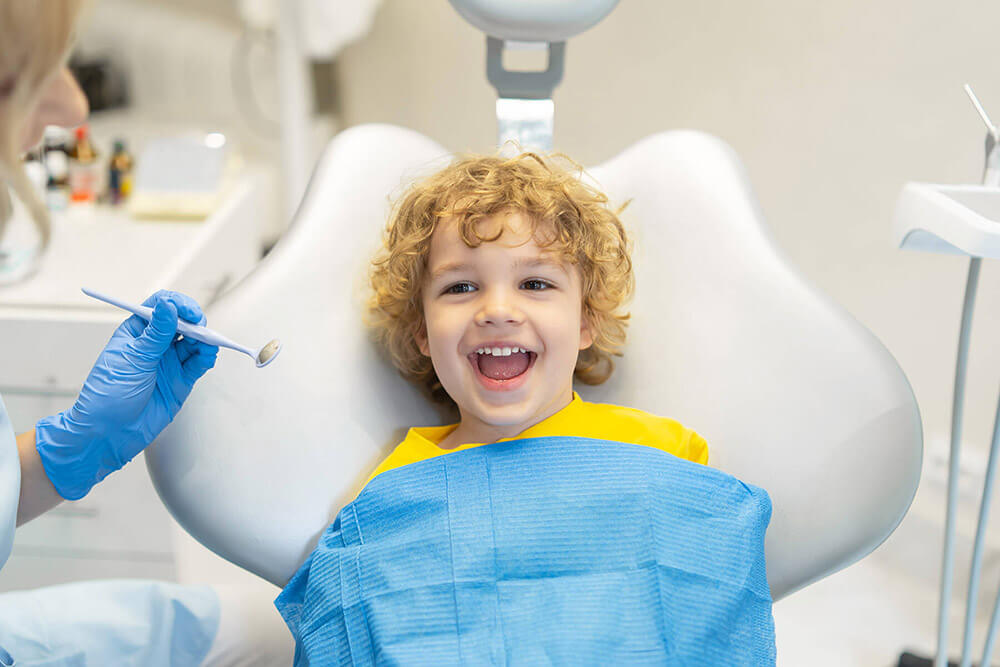A Comprehensive Overview to Pediatric Dental Care and Its Duty in Protecting Against Typical Oral Problems
Understanding pediatric dental treatment is vital for establishing a foundation of long-lasting oral wellness in children. Early oral check outs, correct dental hygiene techniques, and nutritional understanding are crucial components that can substantially mitigate the risk of typical oral troubles such as cavities and malocclusion. By furnishing both caretakers and youngsters with the necessary understanding and abilities, we can cultivate healthy and balanced practices that advertise anxiety-free oral experiences. Yet, the inquiry remains: exactly how can these methods be properly implemented to ensure long lasting outcomes?
Value of Very Early Oral Gos To
Recognizing the importance of early dental visits can establish the foundation for a youngster's long-lasting oral health. Developing a partnership with a pediatric dentist as early as the eruption of the first tooth, usually around six months old, is important. These initial check outs not just acquaint youngsters with the oral environment but also permit early detection of possible issues, such as imbalance or tooth cavities.
Early oral exams equip caregivers with beneficial knowledge regarding proper dental care, dietary referrals, and the prevention of oral diseases. Pediatric dentists are knowledgeable in addressing the unique requirements of kids, making sure that they receive age-appropriate education and learning on dental hygiene. Moreover, these gos to supply an opportunity to go over behaviors such as thumb-sucking and pacifier use, which can influence oral growth.
Essential Oral Hygiene Practices
Establishing a solid foundation for a child's dental wellness exceeds regular dental gos to; it also involves instilling efficient dental health practices from an early age. Caregivers and parents play a critical function in mentor children correct techniques to maintain their dental health and wellness.

Flossing must begin when two teeth touch, as this avoids plaque build-up in hard-to-reach locations. Parents should help their kids with brushing and flossing until they are regarding seven or 8 years of ages to make sure thoroughness.
In addition, establishing normal oral exams every 6 months enables specialist tracking of oral health and wellness. Teaching youngsters the value of dental hygiene and making it an enjoyable, engaging activity can promote lifelong healthy behaviors that are vital in preventing common dental problems.

Role of Nutrition in Dental Wellness
Nourishment plays a critical function in preserving optimum dental wellness, as the foods kids consume can significantly affect the growth and stamina of their teeth. A healthy diet rich in vital vitamins and minerals is vital for building solid enamel and sustaining overall oral health.
Alternatively, a diet high in sugars and acids can lead to destructive impacts on oral health. Sweet treats and drinks can promote the growth of damaging germs in the mouth, bring about raised acidity and a greater risk of dental caries. It is necessary facts about being a dentist for caretakers to urge healthier treat choices, such as fruits, veggies, and whole grains, which not just give necessary nutrients however additionally promote saliva manufacturing, further shielding teeth.
Common Oral Problems in Children
Dental health concerns are an usual problem for many click to read more moms and dads, as youngsters can experience a selection of problems that might affect their oral well-being. One common concern is oral cavities, or cavities, which develop from the demineralization of tooth enamel due to acid-producing microorganisms. This condition is usually aggravated by poor nutritional routines, such as regular usage of sugary treats and beverages.
One more typical problem is malocclusion, where teeth are misaligned, resulting in difficulties in biting, chewing, and speaking. This can result from genetic elements or routines such as thumb sucking and long term pacifier use. In addition, gingivitis, an early kind of gum disease, can happen in youngsters, commonly as a result of insufficient dental health practices. It is identified by red, inflamed gum tissues that might hemorrhage during brushing.
Tooth injuries, consisting of cracks or avulsions, are also constant among active youngsters. These can arise from drops, sports, or mishaps. Early recognition and intervention are essential in taking care of these issues to avoid further problems. Routine dental examinations play an important role in spotting and resolving these common dental problems properly.
Building Lifelong Dental Habits
Instilling great oral health practices early in life sets the structure for a life time of healthy and balanced teeth and periodontals. Developing a consistent regimen for cleaning and flossing is essential; youngsters should brush their teeth twice investigate this site a day with fluoride tooth paste and start flossing as quickly as two nearby teeth touch. Parents play a critical duty in modeling these actions, as youngsters typically copy grown-up techniques.
Informing children concerning the value of oral care can better reinforce these practices. Usage appealing approaches, such as stories or interactive video games, to help them comprehend why regular dental visits and appropriate health are vital. Additionally, introducing a well balanced diet reduced in sugar can significantly lower the risk of dental caries and advertise oral health and wellness.
Normal dental exams, commonly advised every six months, provide a chance for professional support and very early detection of prospective problems. These visits can also assist youngsters construct a favorable association with dental care. By promoting these routines and perspectives from a young age, moms and dads can empower their children to take responsibility for their oral health and wellness, inevitably resulting in a lifetime of positive smiles and lessened oral problems.
Final Thought

Early dental brows through, appropriate dental health practices, and dietary awareness are vital parts that can significantly alleviate the threat of common oral issues such as tooth cavities and malocclusion.Early dental exams equip caregivers with beneficial understanding concerning proper dental care, nutritional suggestions, and the prevention of oral conditions. Routine dental exams play a crucial role in identifying and resolving these common dental problems efficiently.
Early oral sees, along with the application of reliable dental hygiene techniques and appropriate nutrition, dramatically add to the prevention of usual oral troubles such as cavities and gingivitis. By instilling positive dental routines from a very early age, youngsters are much more likely to experience healthy and balanced teeth and periodontals throughout their lives, inevitably fostering a society of dental health that can be maintained right into adulthood.